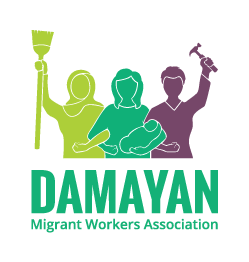Open Letter to Filipino Migrant Workers Mothers about the Cost of Caring
Mother’s Day is just around the corner, and we in Damayan are reflecting on the New Yorker article "Cost of Caring" that elaborated the life and journey of Damayan member and Filipina domestic worker Emma.
"Cost of Caring" elicited different emotions and opinions from thousands who read the article, including fellow Filipina domestic workers. While many expressed support, encouragement and respect for Emma’s determination and resilience to work in the US to support her family back home, it is really sad and baffling to see that some of our kababayans were offended, angry, disdainful, and are in disbelief that Emma shared her life to the world.
Why is it shameful to tell the truth the real life experiences of a Filipino migrant worker? Why were some people offended that we spoke that life in America is hard, that many of us experienced abuse and discrimination and were even physically assaulted in our workplaces? Why is it shameful that we were college graduates in the Philippines who became vulnerable migrant workers doing the work that many do not want to do? Why is it shameful to take care of other people’s children, provide direct personal care to the elderly, clean American homes, and scrub their toilets to provide for our families back home?
Mary Jane Veloso who is a Filipina domestic worker already scheduled to be hanged in Indonesia escaped death when the Indonesian government pardoned her because she was a survivor of labor and human trafficking. Mary’s trafficking case became public and reached the Indonesian government because she courageously spoke the truth about her life as a migrant worker and trafficking survivor.
The tragic execution of migrant worker Flor Contemplacion in Singapore horrified the world. Her family remained strong and opted to speak to the world about her unjust execution. In speaking the truth, the family enabled Flor’s story to be the rallying force against forced migration of Filipino migrant workers and calling for the accountability of the Philippine government.
Why should stories like Emma’s, Mary’s and Flor’s be silenced?
Today, six thousand Filipinos leave the Philippines everyday to look for work overseas. They are scattered in more than 200 countries around the globe. They come from different corners of the Philippines and migrate in the hopes of creating a better life for their families in the homeland. They are leaving because of poverty and lack of job opportunities in the Philippines. Every migrant worker has her/his own story - a doctor in the Philippines is now a driver in Los Angeles, a former vice mayor becomes a waiter in New York, an accountant becomes a domestic worker, and the stories go on.
Leaving the Philippines doesn't come easy. Some of us have to sell or mortgage our homes and land. Many borrow huge sums of money and make the ultimate sacrifice of leaving our children and spouses to take a chance. We come here to the United States, thousands of miles away from where we call home in hopes of finding work abroad and give a better future for our children.
The Philippine government labels Filipino migrant workers as modern heroes. This year, over 10 percent of our people - 11 million Filipinos like Emma - remitted $28.5 billion dollars (World Bank Data 2016 a & 2016b). The remittances do not only support the families back home, but they also support the Philippine economy. But at what cost?
This burden that is now mainly on the shoulder of women migrant workers like Emma has separated mothers from children and has destroyed families. This has to end. The struggle to end forced migration and family separation gets stronger when Damayan members and mothers like Emma decide to speak about their true lives and demand genuine change towards a dignified life in a just society, preferably in our home country.
Linda Oalican
Founder and Executive Director
Damayan Migrant Workers Association
